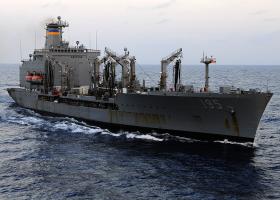 The latest coronavirus outbreak on a Navy ship is on the Military Sealift Command’s (MSC) fleet replenishment oiler, USNS Leroy Grumman. The Project On Government Oversight (POGO) is reporting that the outbreak occurred late last month, barely a week after the MSC assured the public that the coronavirus was not spreading among civilian mariners.
The latest coronavirus outbreak on a Navy ship is on the Military Sealift Command’s (MSC) fleet replenishment oiler, USNS Leroy Grumman. The Project On Government Oversight (POGO) is reporting that the outbreak occurred late last month, barely a week after the MSC assured the public that the coronavirus was not spreading among civilian mariners.
Twenty-two of the 46 civilian crew members and 30 government contractors have tested positive for the coronavirus. One contractor has been reported to have died from COVID-19 while one merchant mariner has been hospitalized in critical condition.
Representatives of the mariner’s union and some lawmakers are raising concerns that failures in MSC “up gangway” policy made the outbreak more likely. MSC’s “up gangway” order has prevented members of the ship’s crew from leaving MSC ships unless replaced. Mariners told POGO that even as they were confined to their ships, the order inexplicably allowed contractors and other personnel to move on and off the ships, piercing the ships’ quarantine “bubble.”
The outbreak on the Grumman, docked at a shipyard in Boston, spread through the crew and to contractors in a matter of days. The entire crew has been isolated in a hotel in Boston since May 2. The House Armed Services Committee has opened an inquiry into circumstances surrounding the outbreak.
In related news, the aircraft carrier USS Theodore Roosevelt, which has been tied up in Guam for the last two months with a coronavirus outbreak, has sailed. The Navy said that the aircraft carrier entered the Philippine Sea on Thursday “to conduct carrier qualification flights for Carrier Air Wing 11.”

In the long run this episode may turn out to have been one of the milder ones. Experts on pathogens tell us to expect such a thing. As with the initial emergence of COVID-19 our minds are wired not to want to “go there” and we’ll try to whistle past the facts, reflected in the optimistic application of “may turn out.”
We could look on this outbreak as an expensive and fairly horrific training exercise to help deal with worse to come. I’m sure the Navy is doing so, in terms of lessons learned, documentation.
It’s not a pleasant type of recurrent training to contemplate.
A couple of excellent articles on the extremely difficult detail work needed to keep crews safe:
https://www.seattletimes.com/seattle-news/trawl-fishing-in-the-age-of-the-coronavirus-first-you-make-it-through-quarantine/
https://www.seattletimes.com/business/as-alaska-fishing-season-set-to-begin-fearful-communities-and-seafood-industry-try-to-prevent-spread-of-coronavirus/
Trying to do this correctly, not imposing involuntary devastation on various “outsiders” is extremely difficult. Trident is doing an exemplary job but even so there’s still too much odds-making in the mix.
This must be the closest any group of people have got to the numbers required* for herd immunity.
*BBC ScienceFocus says:
What is herd immunity?
Herd immunity is what happens when enough people are immune to a disease (in this case, COVID-19) for the chains of transmission to be broken. As more people become immune, infected people are less able to pass on the disease, and the spread of the disease slows down. This provides an indirect form of protection for those who are not immune.
Usually, individuals become immune through vaccination. But there isn’t yet a vaccine for coronavirus, so herd immunity could only currently be achieved if enough people contract the disease and recover, developing an immunity to it in the process.